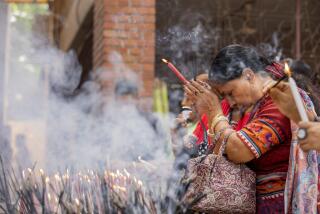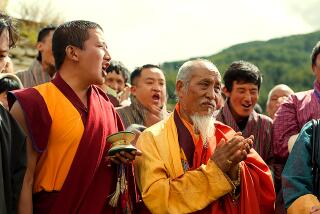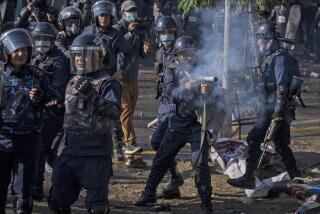Land of Thunder Dragon Opts for Democracy Without Dissent
- Share via
THIMPHU, Bhutan — King Jigme Singye Wangchuck, leader of the Himalayas’ last Buddhist monarchy, boasts four wives, a passion for basketball and a gilded throne.
His latest infatuation is democracy.
In a series of dramatic moves, the king has charted a course aimed at preparing this fabled land of myth and magic for the tedious realities of self-rule.
Since last year, the ruler of the Land of the Thunder Dragon has fired his top advisors, surrendered day-to-day control of his government and, most important, given a group of longtime yes-men the right to throw him off his throne.
“The time has come to promote even greater people’s participation,” the earnest 43-year-old monarch told the National Assembly in a royal edict.
The king’s opponents argue that there was little participation in the first place--and that the reforms do not grant Bhutanese a real role in governing themselves. There are no political parties or constitution in Bhutan. Many dissenters are in prison. Bhutanese who shun the mandatory national dress--which resembles a bathrobe--have to pay fines.
“It’s all eyewash,” said Rongthong Kunley Dorji, a leading pro-democracy activist now living in India. Dorji, who maintains that he was imprisoned and beaten for criticizing the king, fled the country in 1991. The Bhutanese government is seeking his extradition.
Bhutanese officials say the democratic reforms, however tentative, are part of a larger plan to modernize this isolated kingdom while preserving its unique culture. The king and his advisors are betting that it is possible to have the fruits of the 20th century without its side effects--to have literacy without Western culture, wealth without environmental disaster, democracy without dissent.
“Yes, we are trying to have it both ways,” said Ugyen Tshering, Bhutan’s foreign secretary. “We want to modernize Bhutan, and we are determined to do it our own way.”
The obstacles facing Bhutan in its quixotic drive seem as daunting as its own mountains. The Himalayas’ other Buddhist kingdoms--Tibet, Sikkim and Ladakh--have been swallowed by India or China. An embittered minority of ethnic Nepalese, with a different religion and language, resists what it regards as Bhutan’s forced assimilation. About 93,000 ethnic Nepalese, many of them expelled from Bhutan in the early 1990s, are living in refugee camps in eastern Nepal and waiting to return.
The king is hoping to tap the vast reservoir of loyalty among the country’s Buddhist majority. In homes and shops across the country, many Bhutanese display portraits of the king and say they are ready to go wherever they are told.
“He is more than a god,” said misty-eyed Singey Jamtsho, a farmer in the central Bhutanese village of Wangdi. “When you see the king, you feel something you have never felt.”
When the king proposed his democratic reforms last year, many Bhutanese expressed shock at the introduction of Western-style politics into their secluded country. Some Bhutanese fear that trickles from the outside--of music, movies, freedom--will likely turn into a flood and that their proud country will lose its identity.
“Sometimes the young people here copy the Westerners so much that they are almost Westerners themselves,” said Pema Wangdi, a student in Thimphu, Bhutan’s capital.
For all the talk of reform, Bhutan still seems like a country from another epoch. Its rolling landscapes are adorned with dzongs, grandiose forts where claret-robed monks study ancient Buddhist texts. Nomads wander the Himalayan plateaus as they have for centuries, dropping into the valleys to barter yak meat for grain. Buddhist “protector” deities stand guard over the mountain passes, where villagers swap prayers and gifts for the hope of safe passage.
Yet as Bhutan remains a traditional society, so it stays impoverished. A typical Bhutanese earns about $8 a week. Four in 10 Bhutanese children do not get enough to eat, and about half the people older than age 15 cannot read. In a country of rugged terrain, no major highways and only a handful of phone lines, many Bhutanese villages are as isolated as islands in a sea.
Wangchuck, who ascended to the throne at age 16 and plays basketball as often as he can, has set out to both preserve and transform.
To promote a single Bhutanese culture, he imposed a national language--Dzongkha--and ended the teaching of minority tongues in the schools. He launched a program of universal education and has set up primary health centers across the country. He has ordered all Bhutanese to wear traditional clothes--the gho for men and the kira for women--and levied fines on those who refuse. Tourists are allowed to visit, but it is limited to those who can afford to pay a fee of $200 a day.
Though day-to-day control over the government is now in the hands of a Cabinet minister appointed by the king and ratified by the National Assembly, the government has continued to fulfill the king’s vision. In January, the government imposed Bhutan’s first income tax. To protect forests, which cover nearly three-quarters of the country, the government banned the export of timber.
“We Bhutanese value tradition, but if a tradition no longer works, then we must discard it and move on,” said Lyonpo Jigme Thinley, Bhutan’s foreign minister and the head of government.
One tradition officially dumped: Bhutanese are no longer required to prostrate themselves before his majesty.
“We thought that was outdated,” Thinley said.
The democratic changes pushed through by the king last summer are arguably his riskiest gamble yet. By giving the elected National Assembly the right to throw him out of office by a no-confidence vote, the king has for the first time placed a limited democratic check on his own rule.
For now, Wangchuck faces little risk of losing his throne. The National Assembly has traditionally obeyed his every wish. Bhutanese officials say members of the National Assembly are often chosen by a “consensus” among villagers. According to the U.S. government and human rights groups, however, Bhutanese officials often suggest the candidates for the villagers to approve--at public gatherings without secret ballots.
Perhaps the biggest obstacle to the success of the democratic reforms is the disgruntlement of Bhutan’s ethnic Nepalese. Many of the ethnic Nepalese, who make up about 35% of the population, complain that the king has long treated them like outsiders.
Much of the frustration stems from the exodus of thousands of ethnic Nepalese in the early 1990s. Bhutan insists that it deported only illegal immigrants. Yet many refugees in eastern Nepal say they had lived in Bhutan for generations--and were either forced out or did not feel safe enough to stay.
The U.S. government and human rights groups such as Amnesty International largely concur with the ethnic Nepalese. They accuse Bhutan of illegal expulsions, arbitrary arrests and torture. In a recent crackdown, police arrested 150 people calling for more extensive democratic reforms, according to Amnesty International.
Bhutan denies the charges, but the views of the Nepalese minority suggest that the king has a long way to go to make them feel they are a part of the country.
“We are tired of being treated like second-class citizens,” said Tsering, a Bhutanese of Nepalese descent. He used a pseudonym out of fear that he would be jailed.
Tsering said three friends are in prison for political activities, and many others have fled the country. Other ethnic Nepalese in Bhutan can’t find jobs.
Yet despite his despair, a picture of the king hangs in his office.
“Oh that--it’s expected of everyone,” Tsering said. “I used to have high hopes. But he’s still the king. He still has all the power.”
More to Read
Sign up for Essential California
The most important California stories and recommendations in your inbox every morning.
You may occasionally receive promotional content from the Los Angeles Times.










